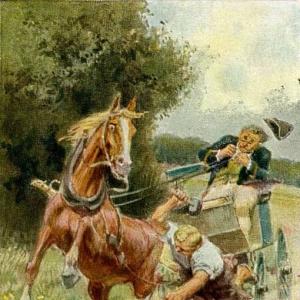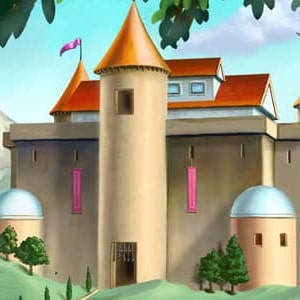Reading time: 16 min
In the days when wishing was still of some use, a King’s son was bewitched by an old witch, and shut up in an iron stove in a forest. There he passed many years, and no one could deliver him. Then a King’s daughter came into the forest, who had lost herself, and could not find her father’s kingdom again. After she had wandered about for nine days, she at length came to the iron stove. Then a voice came forth from it, and asked her, „Whence comest thou, and whither goest, thou?“ She answered, „I have lost my father’s kingdom, and cannot get home again.“ Then a voice inside the iron stove said, „I will help thee to get home again, and that indeed most swiftly, if thou wilt promise to do what I desire of thee. I am the son of a far greater King than thy father, and I will marry thee.“
Then was she afraid, and thought, „Good heavens! What can I do with an iron stove?“ But as she much wished to get home to her father, she promised to do as he desired. But he said, „Thou shalt return here, and bring a knife with thee, and scrape a hole in the iron.“ Then he gave her a companion who walked near her, but did not speak, but in two hours he took her home. There was great joy in the castle when the King’s daughter came home, and the old King fell on her neck and kissed her. She, however, was sorely troubled, and said, „Dear father, what I have suffered! I should never have got home again from the great wild forest, if I had not come to an iron stove, but I have been forced to give my word that I will go back to it, set it free, and marry it.“ Then the old King was so terrified that he all but fainted, for he had but this one daughter. They therefore resolved they would send, in her place, the miller’s daughter, who was very beautiful. They took her there, gave her a knife, and said she was to scrape at the iron stove. So she scraped at it for four-and-twenty hours, but could not bring off the least morsel of it. When day dawned, a voice in the stove said, „It seems to me it is day outside.“ Then she answered, „It seems so to me too. I fancy I hear the noise of my father’s mill.“
„So thou art a miller’s daughter! Then go thy way at once, and let the King’s daughter come here.“ Then she went away at once, and told the old King that the man outside there, would have none of her he wanted the King’s daughter. They, however, still had a swine-herd’s daughter, who was even prettier than the miller’s daughter, and they determined to give her a piece of gold to go to the iron stove instead of the King’s daughter. So she was taken thither, and she also had to scrape for four-and-twenty hours. She, however, made nothing of it. When day broke, a voice inside the stove cried, „It seems to me it is day outside!“ Then answered she, „So it seems to me also. I fancy I hear my father’s horn blowing.“
„Then thou art a swine-herd’s daughter! Go away at once, and tell the King’s daughter to come, and tell her all must be done as promised, and if she does not come, everything in the kingdom shall be ruined and destroyed, and not one stone be left standing on another.“ When the King’s daughter heard that she began to weep, but now there was nothing for it but to keep her promise. So she took leave of her father, put a knife in her pocket, and went forth to the iron stove in the forest. When she got there, she began to scrape, and the iron gave way, and when two hours were over, she had already scraped a small hole. Then she peeped in, and saw a youth so handsome, and so brilliant with gold and with precious jewels, that her very soul was delighted. Now, therefore, she went on scraping, and made the hole so large that he was able to get out. Then said he, „Thou art mine, and I am thine; thou art my bride, and hast released me.“ He wanted to take her away with him to his kingdom, but she entreated him to let her go once again to her father, and the King’s son allowed her to do so, but she was not to say more to her father than three words, and then she was to come back again. So she went home, but she spoke more than three words, and instantly the iron stove disappeared, and was taken far away over glass mountains and piercing swords; but the King’s son was set free, and no longer shut up in it. After this she bade good-bye to her father, took some money with her, but not much, and went back to the great forest, and looked for the iron stove, but it was nowhere to be found. For nine days she sought it, and then her hunger grew so great that she did not know what to do, for she could no longer live. When it was evening, she seated herself in a small tree, and made up her mind to spend the night there, as she was afraid of wild beasts. When midnight drew near she saw in the distance a small light, and thought, „Ah, there I should be saved!“ She got down from the tree, and went towards the light, but on the way she prayed. Then she came to a little old house, and much grass had grown all about it, and a small heap of wood lay in front of it. She thought, „Ah, whither have I come,“ and peeped in through the window, but she saw nothing inside but toads, big and little, except a table well covered with wine and roast meat, and the plates and glasses were of silver. Then she took courage, and knocked at the door. The fat toad cried,
„Little green waiting-maid,
Waiting-maid with the limping leg,
Little dog of the limping leg,
Hop hither and thither,
And quickly see who is without:“
and a small toad came walking by and opened the door to her. When she entered, they all bade her welcome, and she was forced to sit down. They asked, „Where hast thou come from, and whither art thou going?“ Then she related all that had befallen her, and how because she had transgressed the order which had been given her not to say more than three words, the stove, and the King’s son also, had disappeared, and now she was about to seek him over hill and dale until she found him. Then the old fat one said,
„Little green waiting-maid,
Waiting-maid with the limping leg,
Little dog of the limping leg,
Hop hither and thither,
And bring me the great box.“
Then the little one went and brought the box. After this they gave her meat and drink, and took her to a well-made bed, which felt like silk and velvet, and she laid herself therein, in God’s name, and slept. When morning came she arose, and the old toad gave her three needles out of the great box which she was to take with her. They would be needed by her, for she had to cross a high glass mountain, and go over three piercing swords and a great lake. If she did all this she would get her lover back again. Then she gave her three things, which she was to take the greatest care of, namely, three large needles, a plough-wheel, and three nuts. With these she travelled onwards, and when she came to the glass mountain which was so slippery, she stuck the three needles first behind her feet and then before them, and so got over it, and when she was over it, she hid them in a place which she marked carefully. After this she came to the three piercing swords, and then she seated herself on her plough-wheel, and rolled over them. At last she arrived in front of a great lake, and when she had crossed it, she came to a large and beautiful castle. She went and asked for a place. She was a poor girl, she said, and would like to be hired. She knew, however, that the King’s son whom she had released from the iron stove in the great forest was in the castle. Then she was taken as a scullery-maid at low wages. But, already the King’s son had another maiden by his side whom he wanted to marry, for he thought that she had long been dead. In the evening, when she had washed up and was done, she felt in her pocket and found the three nuts which the old toad had given her. She cracked one with her teeth, and was going to eat the kernel when lo and behold there was a stately royal garment in it! But when the bride heard of this she came and asked for the dress, and wanted to buy it, and said, „It is not a dress for a servant-girl.“ But she said no, she would not sell it, but if the bride would grant her one thing she should have it, and that was, leave to sleep one night in her bridegroom’s chamber. The bride gave her permission because the dress was so pretty, and she had never had one like it. When it was evening she said to her bridegroom, „That silly girl will sleep in thy room.“ – „If thou art willing so am I,“ said he. She, however, gave him a glass of wine in which she had poured a sleeping-draught. So the bridegroom and the scullery-maid went to sleep in the room, and he slept so soundly that she could not waken him.
She wept the whole night and cried, „I set thee free when thou wert in an iron stove in the wild forest, I sought thee, and walked over a glass mountain, and three sharp swords, and a great lake before I found thee, and yet thou wilt not hear me!“
The servants sat by the chamber-door, and heard how she thus wept the whole night through, and in the morning they told it to their lord. And the next evening when she had washed up, she opened the second nut, and a far more beautiful dress was within it, and when the bride beheld it, she wished to buy that also. But the girl would not take money, and begged that she might once again sleep in the bridegroom’s chamber. The bride, however, gave him a sleeping-drink, and he slept so soundly that he could hear nothing. But the scullery-maid wept the whole night long, and cried, „I set thee free when thou wert in an iron stove in the wild forest, I sought thee, and walked over a glass mountain, and over three sharp swords and a great lake before I found thee, and yet thou wilt not hear me!“ The servants sat by the chamber-door and heard her weeping the whole night through, and in the morning informed their lord of it. And on the third evening, when she had washed up, she opened the third nut, and within it was a still more beautiful dress which was stiff with pure gold. When the bride saw that she wanted to have it, but the maiden only gave it up on condition that she might for the third time sleep in the bridegroom’s apartment. The King’s son was, however, on his guard, and threw the sleeping-draught away. Now, therefore, when she began to weep and to cry, „Dearest love, I set thee free when thou wert in the iron stove in the terrible wild forest,“ the King’s son leapt up and said, „Thou art the true one, thou art mine, and I am thine.“ Thereupon, while it was still night, he got into a carriage with her, and they took away the false bride’s clothes so that she could not get up. When they came to the great lake, they sailed across it, and when they reached the three sharp-cutting swords they seated themselves on the plough-wheel, and when they got to the glass mountain they thrust the three needles in it, and so at length they got to the little old house; but when they went inside that, it was a great castle, and the toads were all disenchanted, and were King’s children, and full of happiness. Then the wedding was celebrated, and the King’s son and the princess remained in the castle, which was much larger than the castles of their fathers. As, however, the old King grieved at being left alone, they fetched him away, and brought him to live with them, and they had two kingdoms, and lived in happy wedlock.
A mouse did run,
This story is done.
 Learn languages. Double-tap on a word.Learn languages in context with Childstories.org and Deepl.com.
Learn languages. Double-tap on a word.Learn languages in context with Childstories.org and Deepl.com.Backgrounds
Interpretations
Adaptions
Summary
Linguistics
„The Iron Stove“ is a German fairy tale collected by the Brothers Grimm in their compilation of folktales, „Grimm’s Fairy Tales“ or „Kinder- und Hausmärchen,“ first published in 1812. The Brothers Grimm, Jacob and Wilhelm, were German academics, linguists, and cultural researchers who collected and published these tales as part of their efforts to preserve and share the rich cultural heritage of German folklore.
The story follows a traditional fairy tale structure, with a protagonist facing trials and tribulations, magical elements, and an overarching theme of love and loyalty. As with many other Grimm fairy tales, the story contains moral lessons, teaching readers about the importance of perseverance, inner beauty, and staying true to one’s word.
The Brothers Grimm collected their stories from various sources, including oral narratives, written texts, and personal accounts. They sought to preserve the stories in their original form, often including dark and violent elements that reflected the harsh realities of life during their time. Over time, some of the tales, including „The Iron Stove,“ have been modified and adapted to suit more modern sensibilities, while still retaining their core themes and messages.
„The Iron Stove“ is a rich fairy tale that offers multiple interpretations. Here are some key themes and ideas that can be explored through the story:
Perseverance and determination: The King’s daughter’s unwavering determination to find the King’s son, despite the many obstacles she encounters, demonstrates the power of perseverance. Her journey symbolizes the importance of staying true to one’s word and never giving up in the face of challenges.
True love and loyalty: The love story between the King’s daughter and the King’s son emphasizes the importance of loyalty and commitment in relationships. The King’s daughter goes to great lengths to fulfill her promise, and in the end, true love triumphs over deceit and trickery.
Transformation and self-discovery: Throughout the story, the characters undergo significant transformations, both physically and emotionally. The King’s son is freed from the iron stove, while the King’s daughter transforms from a lost, helpless girl to a strong and resourceful woman. This theme highlights the importance of personal growth and self-discovery.
The power of inner beauty: The King’s son values the King’s daughter’s genuine love and loyalty over her outward appearance, as demonstrated by his refusal to accept the miller’s daughter and the swine-herd’s daughter as substitutes. This theme highlights the importance of inner beauty and the significance of character over external appearances.
The role of magic and fate: The magical elements in the story, such as the old toad’s gifts, the glass mountain, and the enchanted castle, serve as important plot devices that both challenge and aid the characters. These elements also suggest that fate plays a role in their lives, guiding them towards their ultimate destiny.
„The Iron Stove“ has inspired several adaptations in various forms of media. Here are a few examples.
Television: The story has been adapted into several television shows and animated series, including „Jim Henson’s The Storyteller“ in 1987 and „Faerie Tale Theater“ in 1983.
Film: The story has been adapted into several films, including the Soviet Union’s 1973 animated film „The Enchanted Stove“ and the 1976 German film „The Iron Stove“.
Literature: The story has inspired several literary adaptations, including the children’s book „The Iron Stove“ by Catherine Storr, published in 1976.
Theater: The story has also been adapted for the stage. In 2013, the Storybook Theater of Hawaii presented a production of „The Iron Stove“ that combined elements of the original fairy tale with Hawaiian culture and mythology.
Video Games: The story has been adapted into several video games, including the 2014 puzzle game „The Enchanted Stove“ and the 2019 adventure game „Enchanted Kingdom: The Secret of the Golden Lamp“.
Overall, „The Iron Stove“ has proved to be a popular and enduring fairy tale that has inspired a wide range of adaptations in various forms of media.
„The Iron Stove“ is a Brothers Grimm fairy tale about a King’s son who is bewitched by an old witch and trapped in an iron stove. A lost King’s daughter discovers the stove and hears a voice promising to help her find her way home if she frees him and marries him. Although reluctant, she agrees and returns with a knife to scrape a hole in the stove. The King’s son is revealed as a handsome, wealthy young man.
Despite her promise, the King’s daughter tries to send a miller’s daughter and a swine-herd’s daughter in her place, but the King’s son recognizes their deception. Eventually, she keeps her word and completes the tasks required to free him. They fall in love, but she speaks more than the allowed three words and the iron stove, along with the King’s son, disappear.
Determined, the King’s daughter embarks on a quest to find the King’s son. Along the way, she encounters magical obstacles, including a glass mountain, three piercing swords, and a great lake. An old toad aids her with three gifts: three large needles, a plough-wheel, and three nuts, which she uses to overcome these obstacles.
Upon reuniting with the King’s son, she must work as a scullery-maid to win him back from a false bride. With the help of the three nuts, which reveal beautiful dresses, she spends three nights with the King’s son, recounting her journey to find him. On the third night, he recognizes her, and they reunite.
They marry and live happily in the castle, which has now transformed from a small house filled with toads to a grand palace filled with disenchanted King’s children. The couple brings the old King to live with them, uniting their two kingdoms in happiness.
„The Iron Stove“ by the Brothers Grimm is a fairy tale that contains classic elements of enchantment, transformation, and the trials of love. Below is a linguistic analysis of some of the key elements of the story:
Structure and Language
Traditional Opening and Closing: The tale begins with a traditional fairy tale opening, „In the days when wishing was still of some use,“ and closes with a rhyming couplet, „A mouse did run, This story is done. “ Such structure is characteristic of oral storytelling, intended to signal the start and end of a narrative.
Repetition: The tale uses repetition strategically, especially in dialogue and events. The King’s daughter encountering different challenges and the repetitive attempts by impostors highlight perseverance and authenticity in fairy tales.
Dialogue and Questioning
Dialogue: The use of direct speech provides immediacy and dramatizes key interactions. For instance, when the voice from the iron stove proposes marriage to the lost princess, the exchange highlights the mysterious and transactional nature of fairy tale engagements.
Question Formulation: Questions posed by the stove’s inhabitant („Whence comest thou, and whither goest, thou?“) followed by the King’s daughter’s straightforward answers establish a pattern that emphasizes the importance of quests and personal journeys.
Characterization through Language
Archetypal Characters: The characters fit into established fairy tale archetypes—the bewitched prince, the faithful princess, the deceitful false brides, and the magical helpers (toads). Characters speak in ways that reinforce their roles, such as the old witch’s traditional curses or the toads‘ chant-like instructions.
Character Speech: Distinctive speech patterns help differentiate characters and add depth. For example, the regal yet ominous commands from the stove contrast with the humble responses of the deceiving maidens.
Symbolism and Imagery
Symbolic Objects: Objects such as the iron stove, knife, glass mountain, nuts, and plough-wheel serve as symbols of the challenges and tools necessary for overcoming obstacles. These items are imbued with significance and represent both the physical and personal hurdles the heroine must overcome.
Imagery: The story creates vivid images through simple yet descriptive language, such as the description of the handsome prince and the dangerous landscapes with „glass mountains“ and „piercing swords,“ which evoke a fantastical setting.
Themes
Perseverance and True Love: The tale emphasizes themes like perseverance, true love, and keeping promises. The King’s daughter consistently surmounts challenges, from scraping the iron stove to navigating dangerous terrains, conveying a message of resilience.
Identity and Transformation: The story explores the theme of identity, both literal (transformations of characters, e. g. , the toads) and metaphorical (the revelation of true character as the story progresses).
Cultural and Moral Values
Moral Lessons: The tale implicitly communicates values such as faithfulness, integrity, and courage. The true bride’s persistence and loyalty are rewarded, while deception is ultimately fruitless.
Social Hierarchy: With its focus on princes, princesses, and commoners like the miller’s and swine-herd’s daughters, the tale reflects the social hierarchy and dynamics typical of the medieval context in which such stories were often set.
„The Iron Stove“ uses linguistic elements typical of fairy tales to communicate a story rich with themes of love, redemption, and the triumph of the true heart over adversity. Through repetition, symbolic language, and structured dialogue, the narrative becomes both a story of personal growth and a reflection of timeless moral lessons.
Information for scientific analysis
Fairy tale statistics | Value |
|---|---|
| Number | KHM 127 |
| Aarne-Thompson-Uther-Index | ATU Typ 425A |
| Translations | DE, EN, DA, ES, FR, PT, IT, JA, NL, PL, RU, TR, VI, ZH |
| Readability Index by Björnsson | 33 |
| Flesch-Reading-Ease Index | 81.8 |
| Flesch–Kincaid Grade-Level | 7.6 |
| Gunning Fog Index | 10.4 |
| Coleman–Liau Index | 7.3 |
| SMOG Index | 7.9 |
| Automated Readability Index | 8.7 |
| Character Count | 11.411 |
| Letter Count | 8.739 |
| Sentence Count | 96 |
| Word Count | 2.226 |
| Average Words per Sentence | 23,19 |
| Words with more than 6 letters | 218 |
| Percentage of long words | 9.8% |
| Number of Syllables | 2.671 |
| Average Syllables per Word | 1,20 |
| Words with three Syllables | 63 |
| Percentage Words with three Syllables | 2.8% |

 Facebook
Facebook  Whatsapp
Whatsapp  Messenger
Messenger  Telegram
Telegram Reddit
Reddit














